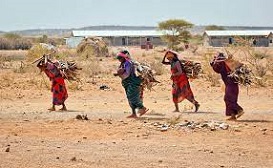The Government of the Netherlands, along with Ethiopia’s Refugees and Returnees Service (RRS) today launched an initiative designed to strengthen the resilience, self-reliance, and inclusion of forcibly displaced persons (FDPs) and host communities in Ethiopia.
Labeled, PROSPECTS partnership, it promoted joint programming between the five PROSPECTS agencies representing innovative collaboration in the forced displacement space, according to the information from UNICEF Ethiopia office.
Ethiopia is the third largest refugee-hosting country in Africa welcoming refugees primarily from South Sudan, Somalia, Eritrea, and Sudan. Recognizing the challenges refugees, internally displaced persons (IDPs) and host communities face, the Netherlands’ government has been playing a pivotal role in bringing together humanitarian and development agencies to promote access to education, livelihoods, protection, and critical infrastructure for refugees, IDPs and host communities.
The first phase of the partnership program from 2020 – 2023 yielded significant results in targeted areas impacted by displacement across three pillars: Education and Training, Employment with Dignity, and Protection and Inclusion.
Key achievements during PROSPECTS phase 1 include:
- 20,218 students gained access to learning opportunities through Accelerated Learning and Skills Development Programs for out of school children and young people.
- 18 facilities such as roads, water detention ponds, and TVET centers were built and rehabilitated that resulted in the creation of 20.000 jobs.
- 26,020 children below the age of 3 years were issued birth certificates.
- Up to 60,000 children were reached with child protection services, including case management, mental health and psychosocial support (MHPSS), referral and access to other essential services.
- The partnership helped further strengthen capacity of government entities involved in justice, security, child protection, and registration.
At the launch event held at the Netherlands Embassy in Ethiopia announcing PROSPECTS’ second phase from 2024 – 2027, representatives from the International Labor Organization (ILO), International Finance Corporation (IFC); United Nations High Commissioner for Refugees (UNHCR), United Nations Children’s Fund (UNICEF); and The World Bank (WB) underscored the impact of PROSPECTS during its first phase and anticipated even greater strides in the next four years.
Henk Jan Bakker, Ambassador of the Kingdom of the Netherlands to Ethiopia, shared, “The Government of the Netherlands seeks to strengthen the prospects of refugees, IDPs and host communities in Ethiopia.
He added, “The Netherlands is proud to continue supporting the PROSPECTS program. This partnership aligns well with the Ethiopian government’s commitments including the pledges made at the 2023 Global Refugee Forum (GRF) and our government’s commitment to promoting sustainable solutions for forced displacement. By investing in education, job creation, protection and critical infrastructure, we can empower both refugees and host communities to build a more resilient future.”
Teyiba Hassen, Director General of the Refugees and Returnees Service highlighted the program’s significance, “The Ethiopian government is committed to creating a more inclusive and prosperous future for all, including refugees. We believe PROSPECTS will play a vital role in achieving this goal.”
She added, “We are actively enhancing the socio-economic inclusion of forcibly displaced people and strengthening host community resilience. Our recent inclusion of refugees and asylum seekers in the National Digital ID system exemplifies the commitment of the Government of Ethiopia to integrating refugees into national systems.”
She also emphasized the significance of collaboration and meaningful engagement of relevant stakeholders in the PROSPECTS partnership to foster a sense of togetherness and leading to better results for improving the management of forced displacement crises in Ethiopia. The Second Phase: A Renewed Commitment
The second phase of PROSPECTS will build on the outcomes from the first phase and focus on delivering concrete improvements in the lives of refugees, IDPs and host communities.
The program will have four key pillars:
- Education and Learning: Equipping young people with relevant skills and knowledge to succeed in school, life, and the workforce.
- Economic Inclusion: Creating opportunities for decent work and livelihoods for FDPs and host communities.
- Protection and Inclusion: Promoting the rights and inclusion of FDPs and ensuring they can access essential services including through a strengthened and inclusive child protection system.
- Critical Infrastructure: Improving infrastructure to facilitate access to, among others, digital connectivity, WASH, and sustainable housing for FDPs and host communities.

